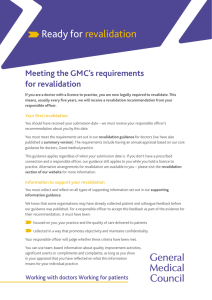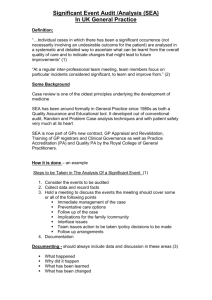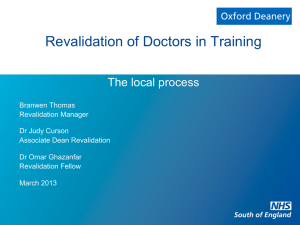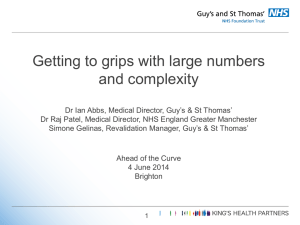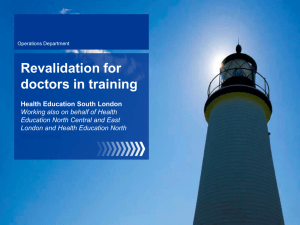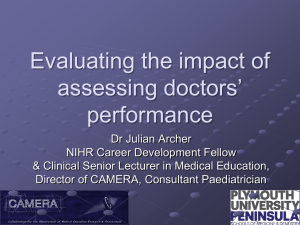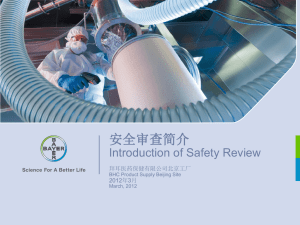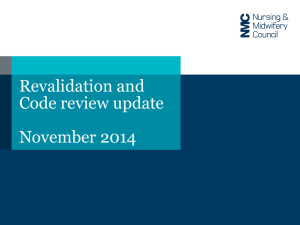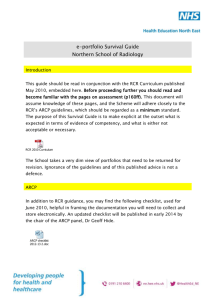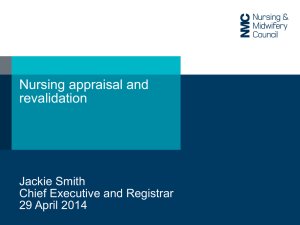Mark Goodwin and Emma Torbé
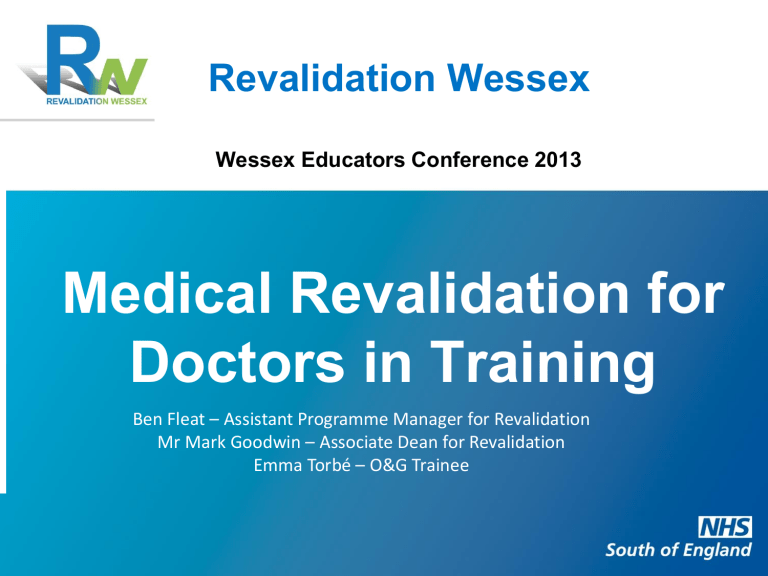
Revalidation Wessex
Wessex Educators Conference 2013
Medical Revalidation for
Doctors in Training
Ben Fleat – Assistant Programme Manager for Revalidation
Mr Mark Goodwin – Associate Dean for Revalidation
Emma Torbé – O&G Trainee
Agenda
• Principles of Revalidation for Doctors in Training
• Process
– Exit Reports
– Educational Supervisor Reports
– Enhanced ARCP
• Questions…
Revalidation Principles
• Doctors in Training (from FY2 to CCT) will be subject to the same regulations as fully qualified, practising clinicians.
• Every doctor is responsible for their own revalidation and must collect evidence.
• The evidence must cover the doctors entire scope of practice.
• The Deanery to which the doctor is attached will be their Designated Body (DR).
• The Postgraduate Dean will be the Responsible
Officer – will make a recommendation about them.
• The enhanced ARCP (or RITA for SpRs) process will take the place of the “Enhanced Medical
Appraisal”.
• Judgements made about a doctor’s revalidation must be based only on the contemporaneous evidence available.
• Doctors in Training should not routinely look outside of their training programme to collect evidence – except where scope of practice is concerned.
Revalidation process for Doctors in
Training
Enhanced ARCP
(panel)
• “Three” points of evidence required
Trust Exit Reports
–
Requested by the Deanery from the employing Trust for information about fitness to practice.
Collective and Exception
Reports.
Form R
– Completed by
Doctor in Training.
Now includes a self declaration covering the
Revalidation Domains.
All information will come to the
Deanery
– ESR and Form R as currently with
Trust reports to the Deanery
•ARCP process will remain in relation to the criteria/curriculum set out by the Royal Colleges.
•Will include an add on
“evidence MOT” annually
Educational Supervisors
Reports
– all supervisors reports will have two additional questions added to them along with a comments section.
Reflection of Work Outside of Training
– this is a reflective tool to help trainees cover their entire scope of practice.
•Suggested recommendation for the
ARCP prior to revalidation due date.
Process for making a recommendation
Cumulative evidence is reviewed at ARCP panel (due date or final ARCP).
Panel to advise on the recommendation to be made.
Evidence reviewed by the RO – particularly if recommended
“deferral”.
RO makes recommendation via
GMC Connect which should link up with
CCT paperwork once that is submitted.
• 2013
• Jan - Mar 0
• April - Jun 7
• Jul - Sep 132
• Oct - Dec 86
Specialty
Allergy
Anaesthetics
CA Psychiatry
Cardiology
Clinical Oncology
Clinical Radiology
D&E
Dermatology
Emergency Medicine
Gastroenterology
General Surgery
Geriatrics
GP
Haematology
Histopathology
ICM
Medical Oncology
Neurology
Neurosurgery
Obs & Gynae
Old Age Psychiatry
OMFS
Ophthalmology
Paediatrics
Palliative Medicine
Psychiatry
Public Health
Renal
Respiratory Medicine
Rheumatology
T&O
Total
1
10
120
1
4
5
3
1
1
6
8
1
2
1
6
2
3
11
2
3
2
2
3
6
1
2
5
9
3
2
1
Trainee perspective
• Overall awareness of what is required is minimal
• Awareness varies significantly between specialties
• Trainees looking to/ relying on deanery for information and guidance
• Concerns over communication between trusts, trainee and RO
